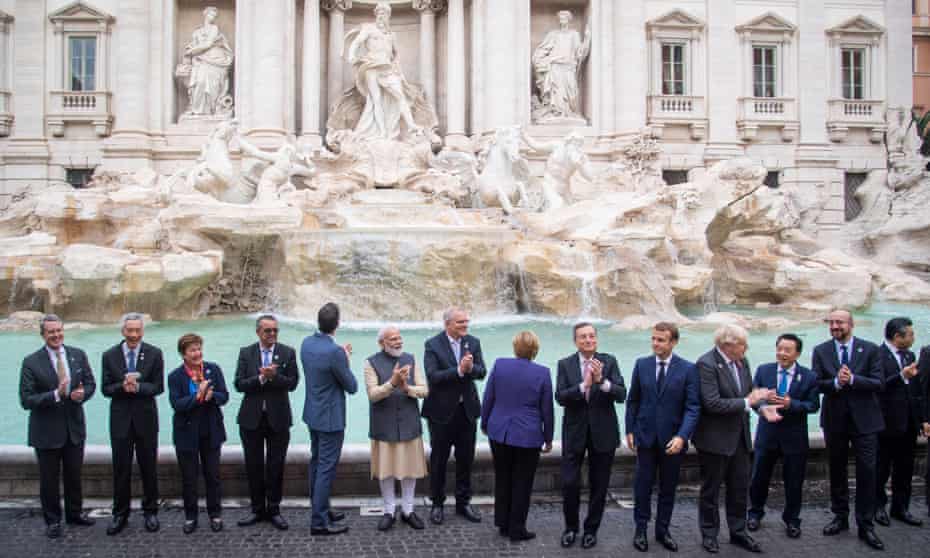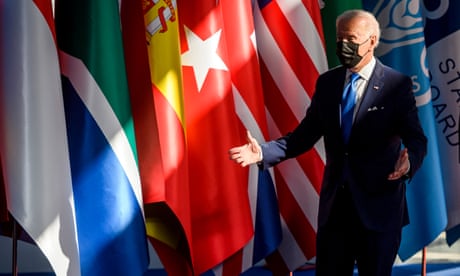Final communique agreed at summit in Italy contains no commitment to reach net zero by 2050.

First published on Mon 1 Nov 2021 00.53 AEDT
World leaders meeting at the G20 summit in Rome have agreed that countries must take meaningful action to keep the world from warming by no more than 1.5C above pre-industrial levels, but are facing criticism for offering few concrete commitments in order to reach the target.
Sunday’s final communique did not include a commitment to achieve net zero carbon emissions by 2050. The G20 leaders instead agreed to wording that underlines the importance of reaching net zero by or around the middle of the century, phrasing that meets the positions of China and Saudi Arabia.
Greenpeace condemned the statement as weak and “lacking ambition and vision”, and said G20 leaders had “failed to meet the moment” before the Cop26 climate conference in Glasgow. “If the G20 was a dress rehearsal for Cop26 then world leaders fluffed their lines,” said its executive director, Jennifer Morgan.
Tom Burke, of the E3G thinktank, however, praised the changes in the language agreed. “This is a shift from what they have previously said. The crucial words are on this decade. Previously they had only talked about 2050, which is too far away,” he said. “This is an expression of a growing sense of urgency in the G20, driven by both events and science. This is a political signal that will add momentum to the Cop and help in reaching agreement at Cop. We were not expecting this language.”
The whole of the G20 summit was seen as a test of multilateralism’s durability after a period in which the world responded to the pandemic by looking inwards.
The communique said: “We will increase our efforts to implement the commitment made in 2009 in Pittsburgh to phase out and rationalise over the medium term inefficient fossil fuel subsidies.”
A reference in an earlier draft to reducing carbon emissions significantly, which Turkey had opposed, was removed in favour of a phrase saying a reduction in fossil fuel use is “one of the most feasible, efficient and quickest ways to limit climate change”.
The Italian hosts were delighted by the outcome, saying they had done “the heavy lifting for Boris Johnson” and the British hosts in Glasgow.
The Italian prime minister, Mario Draghi, who chaired the G20 summit, recalling the words of Greta Thunberg at the Youth4Climate conference in Milan in September, said at the closing press conference: “Many say they are tired of ‘blah, blah, blah’. I believe this summit was full of substance. We have filled the words with substance.”
Draghi added: “Now, for the first time, the whole of the G20 recognises the scientific validity of the one-and-a-half-degree goal, and they commit themselves with a sufficiently significant language.”
He said: “Something has changed at this summit. The G20 has rediscovered the ability to face epochal challenges: Covid-19, climate, health, gender and wealth inequalities. And all these we have discovered are challenges that we cannot overcome alone.”
The UN secretary general, António Guterres, was less enthusiastic, saying: “While I welcome the G20’s commitment to global solutions, I leave Rome with my hopes unfulfilled but at least not buried forever.”
The climate progress was matched by other agreements over the weekend on global taxation, ending the US-EU trade dispute and a commitment to vaccinate 40% of the world’s population against Covid by the end of the year and 70% by the middle of next year.
The communique calls for countries “to update and advance where necessary” nationally determined contributions on carbon emissions this decade, and stresses the importance of fulfilling the commitment to provide $100bn (£75bn) to help poor countries adapt to climate change. The UK has acknowledged that Cop26 is not going to meet the hoped-for $100bn pledge this year.
The language goes just beyond what was agreed six years ago in Paris, when the climate deal called for capping global warming at well below 2C, and ideally closer to 1.5C. Experts say it means halving carbon emissions by 2030 and reaching net zero by 2050. China, one of the world’s largest emitters, has said it will meet net zero by 2060.
On the future of coal, the most contentious issue in framing the agreement, the communique reads: “We will put an end to the provision of international public finance for new unabated coal power generation abroad by the end of 2021.” In terms of domestic coal use, the statement contains only a vague pledge to support those countries that commit to “phasing out investment in new unabated coal power-generation capacity to do so as soon as possible”.
Helen Mountford, a vice-president for climate and economics at the World Resources Institute, said: “For the first time, G20 leaders collectively recognised the importance of reaching net-zero emissions by or around mid-century. It is impressive that 90% of G20 countries have now indicated some intention to reach net-zero, which would have been unfathomable just a few years ago.
“To keep the 1.5C goal within reach, countries need to set 2030 climate targets that chart a realistic pathway to deliver these net-zero commitments. Currently, a number of G20 countries are not on a credible trajectory to reach their net-zero goals, including Australia, Russia, China, Saudi Arabia, Brazil and Turkey. “
The agreements were reached despite the absence of the Russian president, Vladimir Putin, and the Chinese president, Xi Jinping. In another sign of tension, Putin challenged the way carbon emissions are counted in a video address.
“We believe that G20 members should lead the world in creating universal, fair and, importantly, transparent rules for climate regulation when implementing climate and environmental initiatives,” he said. “Such rules need to be based on mutually accepted models for counting and monitoring the emission and capture of greenhouse gases.”

The Italian hosts were pleased with an agreement on global taxation reached on Saturday that will now have to be cleared by the US Congress.
Putin and Xi each cited Covid as their reason for not attending, and instead sent video messages and officials to negotiate on the text. Xi called for greater mutual recognition of other countries’ vaccines, and Putin said Covid was here to stay and required a long-term strategy.
The Indian prime minister, Narendra Modi, promised India would produce 5bn vaccine doses by the end of next year. There was no reference to a plan to lift vaccine patents, seen by some campaigners as the best way to ensure poor countries gain equitable access to vaccines.
No comments:
Post a Comment